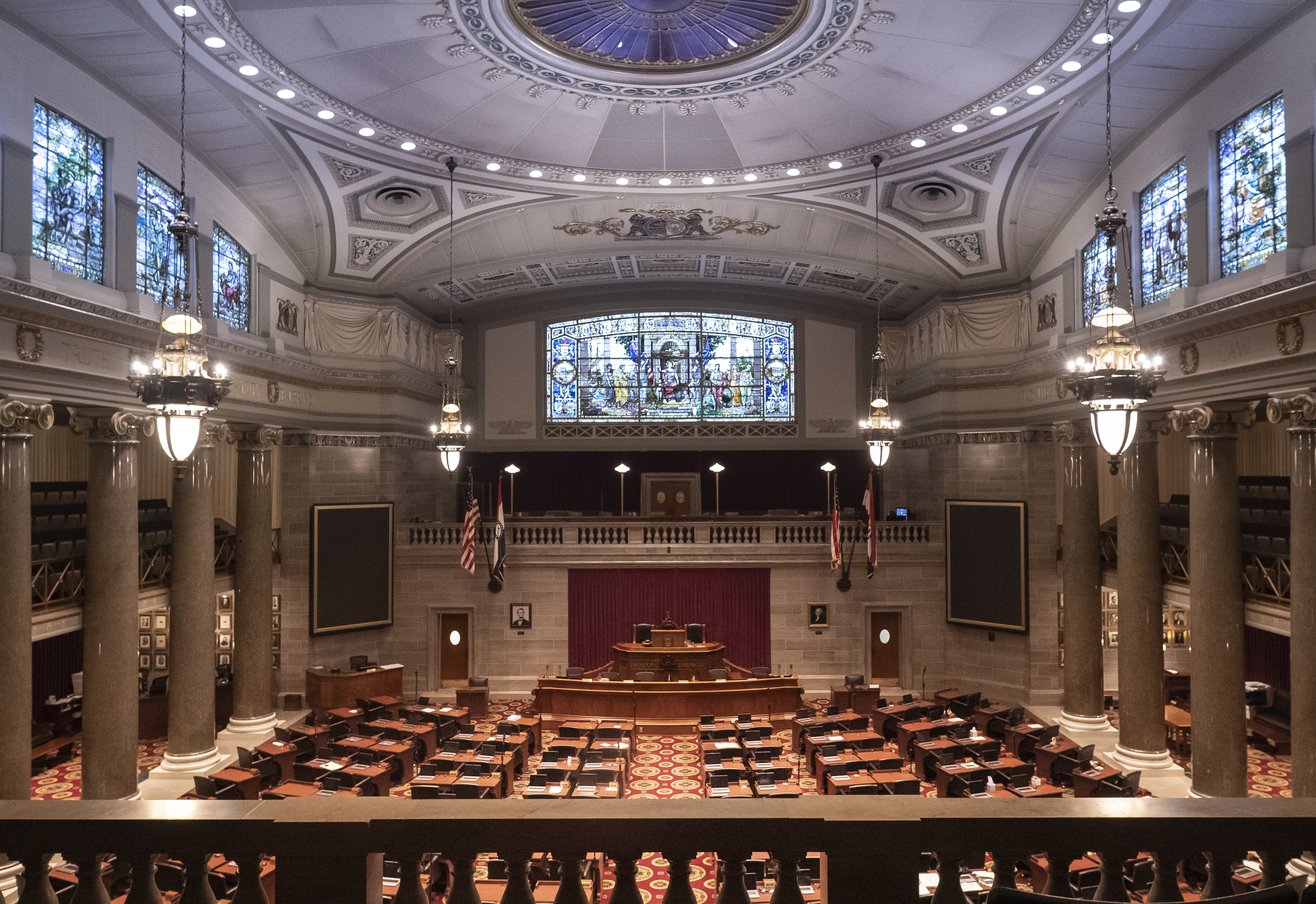During the last week of the session, The Missouri Times will bring you updates of floor activity for each chamber. Below is all the activity in the House from Wednesday, May 12. For live updates on the Senate, click here.
The House adjourned at 6:09 p.m.
Conferences
Rep. Derek Grier moved for the House to refuse to recede on its position for SB 22 and grant the Senate a conference thereon.
SBs 153 and 97, Wayfair, third read and passed
The bill would allow the state to impose a sales tax on online purchases made through vendors with a physical presence in the state, a practice adopted by most other states.
Handler Rep. J. Eggleston said the finalized version would include various concession, including the elimination of income tax on COVID-19 stimulus funds, the creation of an Urban Agricultural Zone Fund, and more. Wayfair would take effect in 2023.
Gov. Mike Parson named Wayfair as one of his legislative priorities of 2021 earlier this year, saying he hoped the “House and Senate will consider legislation to address the unfair advantage online retailers have over small businesses in Missouri.”
The bill would also phase out video service provider fees, modify the use tax economic nexus, and enact a Voluntary Firefighter Cancer Benefits Trust.
An amendment from Eggleston would clarify the language and amend several provisions.
Rep. Peter Merideth opposed the bill, saying it would not be revenue-neutral and would come at a cost to taxpayers while enacting a small tax cut. He noted the state was behind in economic growth and population despite similar small reductions, and that a tax cut could jeopardize the state’s allocation of funds from the federal government.
The amendments were adopted after around an hour of floor conversation on the bill, and the amendment substitute was adopted. The bill was third read and passed 102-42.
An emergency clause on the stimulus portion passed 149-2.
Ozzie Smith
Former Cardinals shortstop and Baseball Hall of Fame member Ozzie Smith made an appearance in the side galleries, prompting various baseball puns on the floor during debate.
SCR 7, Regional Water Commission, third read and passed
The resolution would acknowledge the legislature’s support of the North Central Missouri Regional Water Commission project by allowing an appropriation of no more than $1.5 million for the Multipurpose Water Resource Program Fund.
The project would enhance its water supplier members’ ability to reliably provide drinking water to Northern and Central Missouri, where water has picked up extra minerals that could be harmful. The project has been in the works for two decades.
Legislators spoke in favor of the measure, citing purported recreational and health benefits of the project. It passed 146-0.
HB 273, shampooing, up for third read and passed
Rep. Tom Hannegan‘s bill would establish licensure reciprocity standards for numerous industries, from the military to shampooing. The bill was passed 153-3.
The House recesses
The House went into recess at 3 p.m. and returned at 3:48 p.m.
SB 57, Critical Incident Stress Management Program, third read
The bill from Sen. Karla May would create the Critical Incident Stress Management Program to assist safety officers coping with stress and trauma. The bill also covers an Economic Distress Zone Fund to help revitalize areas with high crime and struggling infrastructure — the fund would revert to general revenue if the appropriation exceeds $3 million.
An amendment from Rep. Nick Schroer to enact a Police Officers Bill of Rights drew the ire of House Democrats. The language adds protections for those who are under investigation or subjected to questioning that could result in disciplinary action or dismissal, and has been included on other bills this session.
Rep. Michael Burton took to the floor with him, delving into the specifics of the amendment and engaging in a heated debate over the lack of similar concessions for others accused of wrongdoings. Democrats spoke in opposition of the measure, noting different versions of the language attached to other bills.
The amendment was adopted by a voice vote and the bill 117-0, with 28 members voting present.
SB 4, transportation, voted down
The bill would allow the Department of Revenue to monitor uninsured drivers through a database of vehicle insurance information. Insurers would be required to maintain records and cooperate with the department in its efforts.
It includes various provisions on insurance, vehicles, and memorial naming. Other sections cover catalytic converter theft and ban Missouri transportation services from requiring vaccine passports.
A clarifying amendment was attached, and the bill was put to a vote through a PQ. It failed 55-93.
SB 365, taxation, third read, emergency clause defeated
The bill would allow citizens to file their personal property taxes online, with a handful of other taxation amendments attached in the House.
An amendment would require new levies and changes to previously approved ones to be clearly indicated on ballots, with sponsor Rep. Jim Murphy citing past issues faced by Missouri voters. After discussion across the aisle, the proposal was PQ’d and adopted.
Rep. Cody Smith proposed an amendment extending the state’s federal reimbursement allowance (FRA) by a year, a measure passed as part of another bill earlier this week. The amendment was adopted with little discussion.
The FRA stalled out in the upper chamber last month after a fracas between members; it was taken up briefly the following week and was once more laid over. Members of the Senate opposed Monday’s attempt over provisions restricting the use of tax money on abortion and birth control stripped away by the House.
Other amendments made small changes to taxation for particular communities, altered the Department of Revenue’s reporting mandates for employers, and workforce development through the Targeted Industrial Manufacturing Enhancement Zones Act.
Other amendments would:
- Place a $100,000 cap on the state’s vacant land lot tax credit
- Remove retailer taxes for stolen or damaged goods
- Establish a transient guest tax capped at six percent per night for hotels and motels, to go toward infrastructure improvements
- Enact a research and development tax credit capped at $10 million total, with $5 million reserved for minority and women-owned businesses and small enterprises.
The bill was PQ’d and passed 86-54.
The sponsor moved tongue-in-cheek to enact an emergency clause related to taxation of federal COVID-19 funds, saying the bill would be signed into law close enough to the deadline not to matter. The motion failed 8-131.
SB 22, tax increment financing (TIF), third read and passed
The bill would modify the definitions of “blighted area” and conservation area” for the purpose of local tax increment financing (TIF) projects. The bill also adds Cass County to the list of counties allowed to implement such projects.
An amendment would alter Community Improvement Districts (CIDs), changing how members are added as well as the bonding and budget process. Another seeks to ensure the definition of “blight” is used for necessary improvement projects.
The bill was third read and passed 147-2.
HB 697, PACE reform, TAFP’d
Rep. Bruce DeGroot’s bill would alter the Property Assessment Clean Energy (PACE) Act program, requiring municipalities taking action with a clean energy development board to notify the Division of Finance of the change, and the division would be required to conduct examinations of a board every two years under the bill.
Other provisions included in the bill would prohibit companies contracting with the PACE program from advertising their contracts unless they and would require landowners to give confirmation that at least one property owner has received a disclosure form as part of the program.
The bill changed slightly in the Senate, with the upper chamber removing provisions requiring banks to give consent for loans and another mandating insurance for PACE financing unless available before passing it back.
DeGroot applauded the efforts of the upper chamber, including Sen. Karla May and Sen. Paul Wieland’s chief of staff Jamey Murphy, in getting the bill through the Senate. DeGroot said the bill would place check the power of the program and protect Missouri consumers.
The bill was truly agreed to finally passed 137-12 after DeGroot thanked the body for its “PACE-ience.”
HB 271, local government expenditures, third read and passed with emergency clause
Rep. John Wiemann moved for the adoption of the conference committee substitute for his bill after exceeding the differences. The 28 amendments attached on the House floor were whittled down to 23 in conference.
The underlying bill would establish the Missouri Local Government Expenditure Database to track expenses and what vendors are used. Amendments include altered regulations on local courts, county commissions, and rented residences.
Another added provision would reign in the power of local officials to enact shutdown orders during health emergencies. The language failed in the Senate as part of a bill sponsored by Sen. Bob Onder in April and was subsequently attached to Wiemann’s bill.
The conference committee report was adopted, and the bill was third read and passed 147-2.
An emergency clause on the local government provision and a section on the St. Louis County collector was adopted 140-12.
House gavels in
The legislative day began at 10:09 a.m.
HB 33 fails in committee
The House Children and Families Committee voted down HB 33, a controversial bill prohibiting physicians from administering gender reassignment surgery for patients under the age of 18, Wednesday morning.
Fiscal Review
A handful of Senate bills made it through the House Fiscal Review Committee before morning session began:
- SB 141 from Sen. Jason Bean would prohibit subdivisions from adopting ordinances restricting utility reconnections. It passed the committee 5-2.
- SB 36 from Sen. Mike Bernskoetter would establish the Capitol Complex Tax Credit. It passed 7-0.
- SB 46 from Sen. Lincoln Hough would make several changes to transportation regulations. It passed 7-0.
- SB 202 from Sen. Mike Cierpiot would enact various new utility provisions, including one allowing utilities to apply to issue securitization bonds. It passed 7-0.
ICYMI: Senate approves reform school legislation
The Missouri Senate approved the bipartisan reform school legislation Tuesday meant to add greater protections for children at the state’s unlicensed facilities. The Senate substitutes added some concessions from hesitant lawmakers, including assurance due process rights would be adhered to.
The bills from Reps. Rudy Veit and Keri Ingle have been referred to the House Fiscal Review Committee.
Capitol Briefs: Senate approves reform school protection legislation

Cameron Gerber studied journalism at Lincoln University. Prior to Lincoln, he earned an associate’s degree from State Fair Community College. Cameron is a native of Eldon, Missouri.
Contact Cameron at cameron@themissouritimes.com.













